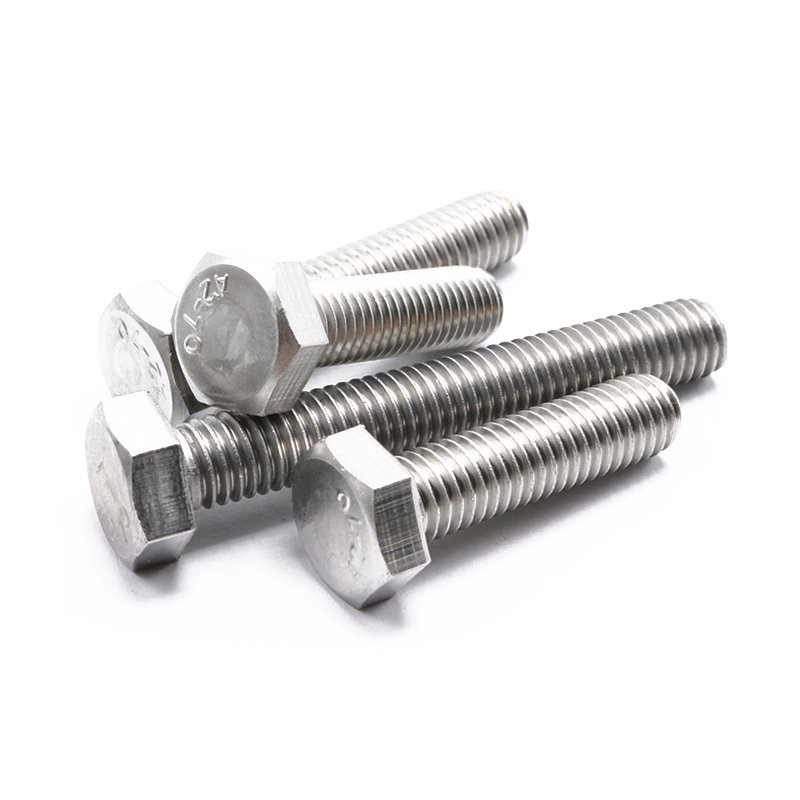Hex screws with locking mechanisms offer several advantages, especially in applications where vibration, movement, or external forces could cause fasteners to loosen over time. Below are some key benefits:
Prevention of Loosening Due to Vibration:
Locking mechanisms, such as nylon inserts (e.g., nyloc hex screws), serrated flanges, or chemical thread-locking compounds (like Loctite), help to secure the screw in place, preventing it from loosening under continuous vibration or dynamic forces. This is particularly valuable in industries such as automotive, aerospace, and heavy machinery, where vibrations are common.
Improved Assembly Integrity:
Locking mechanisms ensure that the fastener remains tight over time, even in harsh environments. This contributes to the long-term reliability and integrity of the assembly, reducing the risk of parts coming apart due to fastener failure.
This can improve the safety of the final product, especially in critical applications like structural components, machinery, and safety-sensitive environments.
Reduction in Maintenance Needs:
With a locking mechanism in place, there is less need for frequent maintenance checks to tighten screws or reapply locking compounds. This can reduce labor costs and downtime in production or operations, making it an efficient solution in industries where continuous operation is required.
Enhanced Resistance to Harsh Conditions:
Chemical thread-locking agents provide a permanent bond, adding an extra layer of resistance to external conditions such as moisture, heat, chemicals, and corrosive environments. This makes them ideal for use in industries like marine, oil & gas, and automotive, where exposure to harsh conditions is frequent.
Serrated flange hex screws also provide a better grip and resist loosening even under tough environmental conditions without the need for additional adhesives or inserts.

Increased Torque Resistance:
Locking mechanisms such as nylon inserts or serrated flanges help distribute the applied torque more evenly and create more friction between the screw and the surface material. This helps the screw to better resist the forces that might otherwise cause it to loosen or fail, improving overall torque resistance and stability.
In high-torque applications, locking features can ensure the fastener stays firmly in place without the risk of stripping threads.
Easier to Install and Remove:
Nylon-insert hex screws, for example, can still be easily installed and removed, but the nylon insert provides a resistant fit that prevents unintentional loosening. This allows for better control and repeatability when assembling and disassembling components.
Serrated flange hex screws often don’t require additional locking devices like washers, simplifying installation.
Cost-Effective Solution:
While some locking mechanisms (such as chemical thread-lockers) may add a small additional cost, they are often more cost-effective than continuously replacing screws or checking for loose fasteners, particularly in high-volume applications. Serrated flange hex screws can replace the need for separate washers, saving costs in some cases.
Prevention of Over-Tightening:
Locking mechanisms such as nylon inserts or pre-applied thread-locking adhesive often help prevent over-tightening. In many cases, over-tightening can cause material deformation or thread stripping, and locking mechanisms can reduce the risk of this happening by creating friction and resisting loosening before excessive torque is applied.
Versatility Across Applications:
Hex screws with locking mechanisms can be used in a wide range of applications, from light-duty to heavy-duty uses, making them versatile for different environments and needs. They provide consistent performance without the need for additional locking washers, gaskets, or adhesives in many applications.
They are particularly effective in environments where disassembly may be required occasionally, but where the fastener needs to remain secure during normal use.
Enhanced Durability:
When used with locking mechanisms like serrated flanges or nylon inserts, hex screws can maintain their tightness even under the influence of temperature cycling, moisture, or aggressive chemicals, ensuring long-lasting fastening performance without frequent replacements or adjustments.


 English
English 中文简体
中文简体 Español
Español русский
русский عربى
عربى







